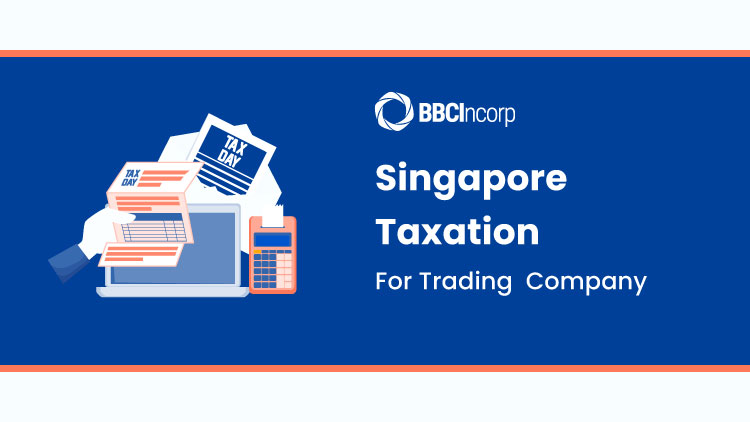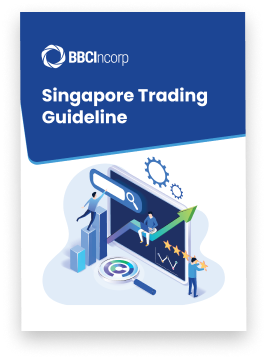
Global connectivity is the catalyst for Singapore’s climb to economic prowess in the modern era, with thousands of ports, airways, and shipping lines dotting its logistic landscape.
This makes it a prime location for east-west trades and a gateway towards the ever-expanding market of Mainland China.
But for all these promising boons, businesses must abide by an underlying set of taxes and regulations in return.
Knowing how each tax regiment and trading incentives apply to your case is therefore crucial in getting your Singapore trading company off the right start.
Common taxes apply to Singapore trading companies
Many different types of taxes may apply to Singapore trading companies, including income tax, goods, and services tax (GST), and stamp duty.
Corporate Income Tax
Corporate Income tax is a tax on the income of a company. Singaporean resident companies are subject to an income tax on their worldwide income.
Although a fixed corporate tax rate of 17% is imposed on tax resident and non-resident companies, the prior has more incentives down the line due to being locally established.
For companies established in Singapore but derive their income from outside its borders, the income is then classified as “foreign income” and becomes taxable upon accrual.
Note that this amount must be paid regardless of whether the income is received in Singapore or not.
As a result, tax residents are provided with extensive tax relief under certain conditions to remediate double taxation.
Taxable income includes profits, gains, and remittances from business activities, as well as rental income, interest, dividends, and other forms of passive income. Expenses that are deductible for income tax purposes include business expenses, capital allowances, and reliefs.
Goods and Services Tax (GST)
Goods and Services Tax (GST) is a tax on the sale of goods and services as well as the importation of goods in Singapore. Goods and services are categorized into taxable and non-taxable with their own rate on GST.
Stamp duty is a tax on the transfer of immovable properties (e.g. land, real estate possessions), stocks, or shares.
The rate of stamp duty varies depending on the value of the property being transferred. Trading companies must pay stamp duty when purchasing or selling property in the Singapore territory.
Update GST rate
The GST rate will increase to 8% on January 1, 2023. Businesses that register GST must adjust to the changed rate. More details here.
Common taxes for eCommerce Businesses
Several taxation categories levied on eCommerce entrepreneurs in Singapore are as follows:
- Corporate Income Tax: a tax on the profit of both local and foreign companies with a flat rate of 17% of their chargeable income.
- Goods and Services Tax: GST is a tax on the sale of goods and services, applying to the value of goods and services that are sold in Singapore. The currently set at 7% and will rise to 8% starting Jan 1, 2023.
Do pay attention to the factors impacting your enterprise’s tax obligations and other potential challenges when operating in Singapore.
How to comply with tax obligations in Singapore
As with any other business venture, operating in the trading space requires you to be aware of tax obligations. To comply fully, it is recommended that you seek service from a professional accountant or tax advisor for more accuracy.
To comply with the present tax law, trading companies must register for tax purposes with the Inland Revenue Authority of Singapore (IRAS). This can be done online at IRS.
It is important to seek professional advice from an accountant or tax advisor to ensure that tax obligations are met correctly and on time. In order to comply with Singaporean tax law, trading companies must register for tax purposes with the Inland Revenue Authority of Singapore (IRAS). This can be done online at www.iras.gov.sg.
A Singaporean trading company must register for GST if its annual turnover exceeds S$1 million, and file regular GST returns. You must also pay income tax on your profits, and may be required to pay stamp duty on property transactions.
All Singaporean companies, including trading companies, are required to file regular tax returns. The deadline for filing tax returns is usually 31 May of the following year. Another equally important tax obligation is the Estimated Chargeable Income (ECI).
Quick tip
It is important to keep accurate financial records so that you can accurately report your company’s income and expenses to the tax authorities.
Singapore has a highly developed and efficient tax system, and by complying with your tax obligations you can be sure that you are operating within the law.
Supporting measures for the Singapore government to trade businesses
Singapore also has some tax incentives in place to support trading companies. These measures include:
- Fast and easy company incorporation procedures
- Tax exemptions for start-ups, and the partial exemption for all companies
- Deduction on expenses incurred before the business formation
A tax exemption scheme for startup companies was introduced in 2005 as an initiative from Singapore to further cultivate its entrepreneurial economy. In 2018, the scheme was further amended with the change being in effect from YA 2020 onward.
To qualify for this exemption, trading companies must meet certain conditions laid down by the Inland Revenue Authority of Singapore (IRAS).
In addition, Singapore offers a variety of other tax incentives to help trading companies that meet certain conditions grow their businesses. These include the Pioneer Service Tax Incentive and the Productivity and Innovation Credit (PIC) scheme.
The latter is larger in scope, and available to all qualifying businesses whereas the prior only applies to companies that are registered for Singapore income tax.
Singapore has also introduced the Singapore International Commercial Court (SIACC), which provides a fast and efficient way to resolve cross-border disputes.
All of these measures make Singapore an attractive place to do business and help to ensure that trading companies in Singapore can grow and compete in the global marketplace.

New guide
Unlock insights of Singapore's trading business!
Everything you need to know about starting an overseas trade business in Singapore.

Conclusion
If you are planning to set up a company in Singapore for your trading endeavor, this would certainly be the right decision. Not only is the corporate income tax exempted, but you also have several measures in place to support the business, including various tax concessions and additional benefits.
For further information on how to form and run your business in Singapore as well as the related services, talk with our consultant via service@bbcincorp.com or leave a message in the chatbox.
Disclaimer: While BBCIncorp strives to make the information on this website as timely and accurate as possible, the information itself is for reference purposes only. You should not substitute the information provided in this article for competent legal advice. Feel free to contact BBCIncorp’s customer services for advice on your specific cases.
Industry News & Insights
Get helpful tips and info from our newsletter!
Stay in the know and be empowered with our strategic how-tos, resources, and guidelines.





